Trending Now
We have updated our Privacy Policy and Terms of Use for Eurasia Group and its affiliates, including GZERO Media, to clarify the types of data we collect, how we collect it, how we use data and with whom we share data. By using our website you consent to our Terms and Conditions and Privacy Policy, including the transfer of your personal data to the United States from your country of residence, and our use of cookies described in our Cookie Policy.
{{ subpage.title }}
The dangers of sportswashing for the Olympics
Should there be a limit on foreign investment in professional sports? Sportswashing—when a government uses sports to improve its country’s reputation, distract from human rights abuses, or political controversies—has become a major problem in athletics and pro sports. But can governments do anything to stop it?
Washington Post sports columnist Sally Jenkins joined Ian Bremmer on GZERO World ahead of the Olympic Games in Paris to talk about politics, sports and how they overlap. Saudi Arabia has invested billions of dollars in the last few years in sports like golf and tennis to help burnish its global reputation as a modern, forward-looking country. Sportswashing isn’t just a moral issue but also a political one, Jenkins points out, because the more foreign money that gets entangled in domestic companies, the more difficult it is for governments to draw a red line. Jenkin also addresses the NBA’s complex relationship with China on issues like Hong Kong, another example of how financial ties can lead to compromising on democratic values, a position Jenkins calls “the anaconda in the chandelier.”
Watch full episode: The politics of the Paris Olympics
Season 7 of GZERO World with Ian Bremmer, the award-winning weekly global affairs series, launches nationwide on public television stations (check local listings).
New digital episodes of GZERO World are released every Monday on YouTube. Don''t miss an episode: subscribe to GZERO's YouTube channel and turn on notifications (🔔).
Could the Olympics ever be free of politics?
Should politics play a role at the Olympic Games? The International Olympic Committee insists the Games are non-political, but in practice, that’s never really been the case. From boycotts to political protests to national scandals, politics always loom large at the Olympics, and the 2024 Paris Games are no exception.
Washington Post sports columnist Sally Jenkins joins Ian Bremmer on GZERO World to talk about how politics and sports overlap at the Olympics and beyond, including the IOC’s troubling coziness with authoritarian countries like China and Russia. Jenkins points to the Olympic Truce and the history of international cooperation at the Games but also stresses that this Olympics is taking place amid one of the most divisive political eras in decades. Despite the controversies and geopolitical tensions at the games, she says it is the athletes themselves that “scrape the grime” off the Games and make them so inspiring. The effort and commitment to compete after training for four years, she says, is one of the “great competitive miracles we all get to watch.”
Season 7 of GZERO World with Ian Bremmer, the award-winning weekly global affairs series, launches nationwide on public television stations (check local listings).
New digital episodes of GZERO World are released every Monday on YouTube. Don''t miss an episode: subscribe to GZERO's YouTube channel and turn on notifications (🔔).
The politics of the Paris Olympics
As the political drama ramps up in the US, Democrats have acted with remarkable speed and solidarity to pass the torch to VP Kamala Harris. At the same time, the world’s most elite athletes are gathering along the Seine in Paris to light a more literal torch, of the Olympic variety.
Washington Post sports columnist Sally Jenkins joins Ian Bremmer on GZERO World to talk about some of the biggest stories leading into the 2024 Olympic Games in Paris, including security challenges, the ban on Russia’s Olympic Committee due to the war in Ukraine, and growing calls for reform within the IOC, which has faced accusations of corruption and bid rigging in recent years. The IOC insists the Games aren’t political, but in practice, that’s never really been the case. This year, a doping scandal involving Chinese swimmers, Russian disinformation, and mounting calls for Israeli athletes to compete under a neutral flag threaten to overshadow the City of Light’s big celebration. Jenkins and Bremmer also dig into Saudi sportswashing, China’s relationship with pro sports teams in the US, and the WNBA’s most-watched season in history.
Season 7 of GZERO World with Ian Bremmer, the award-winning weekly global affairs series, launches nationwide on public television stations (check local listings).
New digital episodes of GZERO World are released every Monday on YouTube. Don''t miss an episode: subscribe to GZERO's YouTube channel and turn on notifications (🔔).
Ian Explains: Why authoritarian rulers love the Olympics
The International Olympic Committee says global politics have no place at the Olympics and insists the Olympics promote democratic values through sports, so why does the IOC keep awarding the Games to authoritarian countries like Russia and China?
On Ian Explains, Ian Bremmer breaks down the complicated relationship between global politics and the Olympic Games. The IOC has an uncomfortable history of cozying up to authoritarian rulers, like Russian President Vladimir Putin and Chinese President Xi Jinping, who use the Games as propaganda, who use the Games to project the image of their country they want the world to see. Calls are growing for more transparency in the IOC, which has faced accusations of corruption, bribery, and bid-rigging in recent years. The 2024 Olympics will be a test of the IOC’s ability to remain politically neutral while balancing the ideals of democracy with the geopolitical realities of a world that’s more fragmented than ever. Can they stick the landing?
Watch more on the full episode of GZERO World with Ian Bremmer, in which Washington Post sports columnist Sally Jenkins discusses security concerns and logistical challenges at the 2024 Paris Olympic Games, the complicated relationship between global politics and the events, and sportswashing.
Season 7 of GZERO World with Ian Bremmer, the award-winning weekly global affairs series, launches nationwide on public television stations (check local listings).
New digital episodes of GZERO World are released every Monday on YouTube. Don''t miss an episode: Subscribe to GZERO's YouTube channel and turn on notifications (🔔).
At the 2024 Paris Olympics, security fears and logistical challenges abound
The 2024 Summer Olympics kick off in Paris, France, this week, as the world’s most elite athletes and over 300,000 spectators gather along the Seine for one of the most ambitious Opening Ceremonies in the history of the Games. But will Paris pull it off?
On GZERO World, Ian Bremmer sits down with Washington Post sports columnist Sally Jenkins for a preview of what to expect at the 2024 Paris Olympics, along with security challenges and political concerns going into this year’s Games. Global conflicts loom large, threatening to overshadow the City of Light’s big celebration. Following the IOC ban on Russia’s Olympic Committee due to the war in Ukraine, Russia has been spreading AI-generated misinformation around the Games, increasing the threat of terrorism. The 2024 Games will be a huge challenge because the Olympic sites are embedded throughout the city of Paris and across France. The logistics are so complicated Jenkins predicts it will be “the most difficult Olympics to secure by a long shot.”
Look for the full interview with Sally Jenkins on GZERO World with Ian Bremmer, airing on US public television soon (check local listings.)
Season 7 of GZERO World with Ian Bremmer, the award-winning weekly global affairs series, launches nationwide on public television stations (check local listings).
New digital episodes of GZERO World are released every Monday on YouTube. Don''t miss an episode: subscribe to GZERO's YouTube channel and turn on notifications (🔔).
- What We’re Watching: Putin’s propaganda, new Iran-Israel feud, Title 42 tussle ›
- Ian Explains: Who does China and Russia want to win the US election, Biden or Trump? ›
- France’s center right splits over cooperating with Le Pen ›
- Politics, protest & the Olympics: the IOC’s Dick Pound ›
- Paris 2024 Olympics chief: “We are ready” ›
- Could the Olympics ever be free of politics? - GZERO Media ›
- The dangers of sportswashing for the Olympics - GZERO Media ›
- Ian Explains: Why authoritarian rulers love the Olympics - GZERO Media ›
Kylian Mbappé of France during the UEFA Euro 2024 Football Championship match between Austria and France on June 17, 2024
Footballer Kylian Mbappé attacks France’s far right
“We’re at a crucial moment in our country’s history,” Mbappé warned, alluding to what he sees as threats posed by Marine Le Pen’s far-right National Rally, which performed spectacularly in the recent European parliamentary elections, spurring President Emmanuel Macron to dissolve parliament and call for snap elections. Mbappé encouraged fans to vote on June 30 to block the “extremes knocking at the doors of power.”
Many players on the French team are immigrants or children of immigrants – Mbappé’s parents are from Cameroon and Algeria – putting them at odds with Le Pen’s plans to limit migration strictly. Mbappé’s announcement came hours after his teammate, Marcus Thuram, also urged fans to vote against the far right.
His call to action came after tens of thousands took to the streets of France on Saturday to denounce the far right in protests organized by labor unions and supported by the newly formed left-wing coalition. Polls show the National Rally in the lead, but we’ll be watching to see whether the backlash gains momentum against the far-right’s success ahead of the vote at the end of the month.
2023's biggest winners and losers in global politics
THE WINNERS
Putin
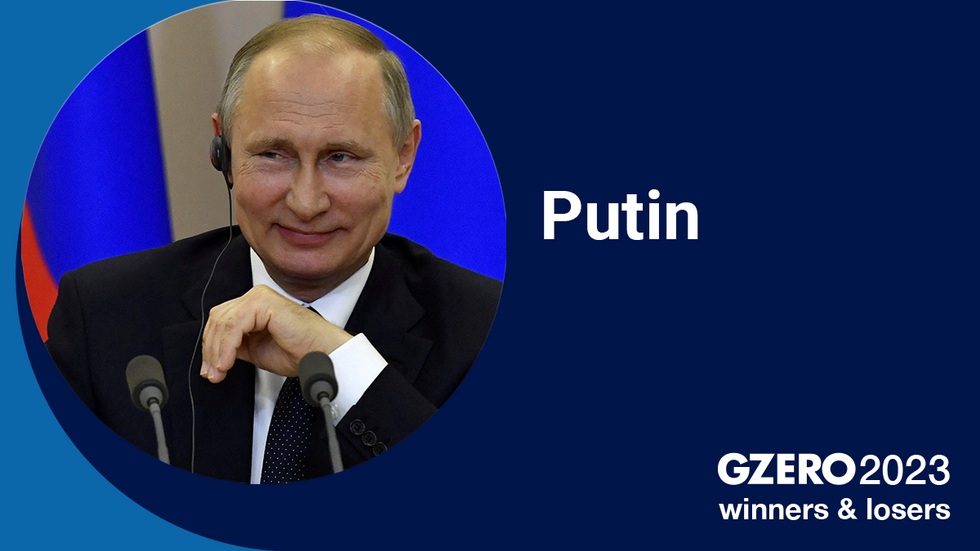
To be fair, things aren’t great for Vladimir Putin – NATO is still stronger, and his economy is weaker than it’d be if he hadn’t invaded Ukraine. But from a low bar, 2023 was a clear winner for the Russian strongman. Ukraine’s vaunted counteroffensive failed to impress, Western attempts to cap the price of Russian oil faltered, and even an insurrection by his warlord-in-chief only seemed to make him stronger. Putin heads into 2024 happily watching the US Congress squabble over further aid for Ukraine, and who knows, next Christmas might just come early for the Kremlin if Donald Trump can win the US election in November.
Trump
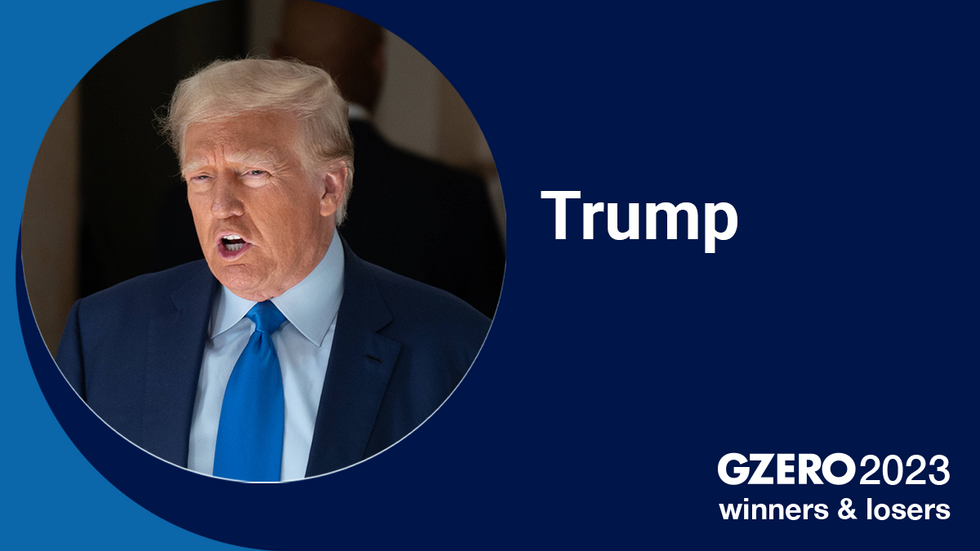
Speaking of which, at the top of this year, the twice-impeached Teflon Don looked like he’d be getting fitted for a prison jumpsuit rather than filing campaign papers. But the bevy of state and federal legal cases against him – some of which were hard for non-lawyers to make sense of – only fired up his base. As a result, he’s not only miles ahead of any GOP challengers for the 2024 nomination, some polls also show him outright leading Joe Biden, who has suffered with voters because of perceptions of his age, inflation, a migration crisis at the southern border, and his controversial handling of the Gaza war.
India
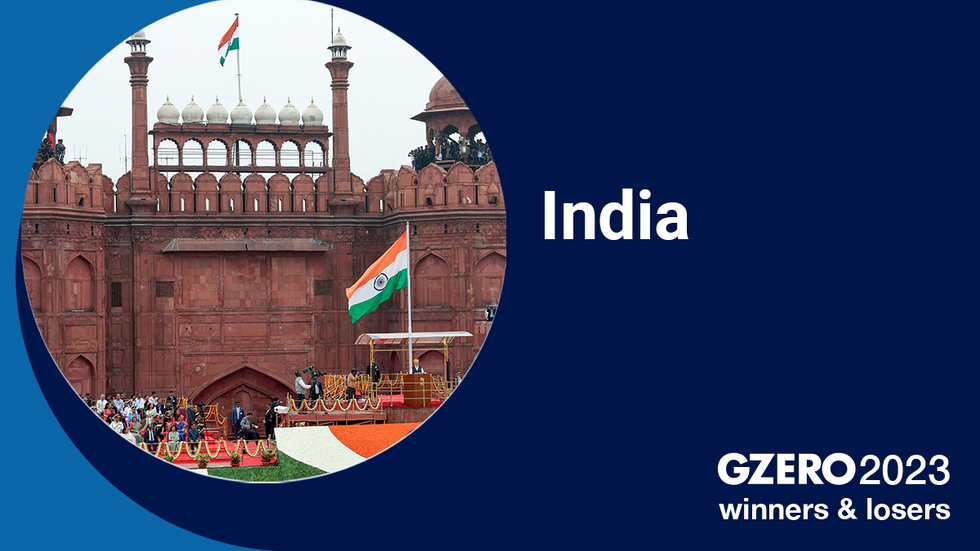
This year, India eclipsed China as the world’s most populous country, defended its title as the fastest-growing major economy, and even landed a spacecraft on the moon. At the same time, PM Narendra Modi used his country’s 2023 presidency of the G20 and his deepening ties with the US to position himself as a vitally important diplomatic bridge-builder between the wealthy G7 countries and the developing nations of the so-called Global South. Popular at home, increasingly influential abroad, and with a flag on the moon to boot, Modi – who faces elections in 2024 – has guided his country to a winner of a year.
Nicolás Maduro
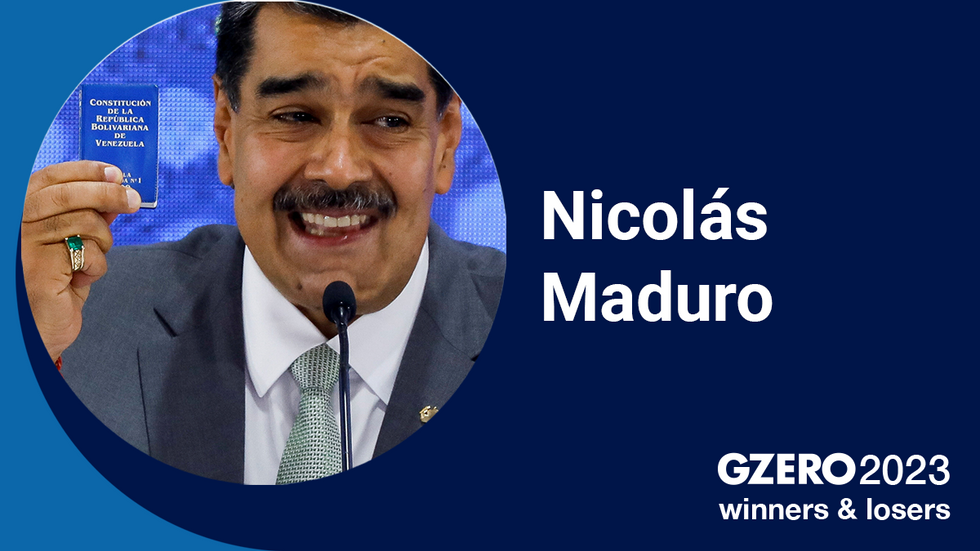
It was a feliz 2023 indeed for the strongman of Caracas. Most of the world quietly stopped supporting his erstwhile rival Juan Guaidó (remember him?), and rising global oil prices forced Washington to rethink its financial stranglehold on Caracas, offering oil sanctions relief in exchange only for some spotty promises that Maduro will hold a free and fair presidential election next year (fat chance.) By the end of 2023, an emboldened Maduro was even feeling frisky enough to threaten to invade his neighbor Guyana.
People willing to play Golf in Saudi Arabia

At first, it seemed inconceivable. Surely the whispers about Saudi Arabia offering golfers hundred-million-dollar contracts to defect to the desert were just fairway gossip, right? But Riyadh made it real when the Saudi-backed upstart LIV Golf absorbed the 107-year-old PGA Golf Tour in June. Critics said the Saudis were just “sportswashing” away an awful human rights record, but supporters said it was time to bust the PGA’s stuffy old monopoly. Meanwhile, the greens look even greener as prize money grows, and even the last-place finishers in LIV tournaments can take home $120,000!
THE LOSERS
AI Cassandras

In March, Elon Musk and a group of artificial intelligence leaders published an open letter warning that AI systems posed “profound risks to society and humanity” and called for a “public and verifiable” six-month pause in “the training of AI systems more powerful than GPT-4.”
It didn’t happen. Increasingly complex and powerful AI systems may indeed pose existential dangers for the human race (alongside their tremendous benefits), but a global pause in any form of technological progress – let alone one this pervasive, powerful, or flat-out entertaining – is impossible to enforce. For the Ancient Greeks, it was Cassandra’s fate to be ignored. But wasn’t it also her destiny to be correct? 2024 will be a huge year for AI.
Benjamin Netanyahu
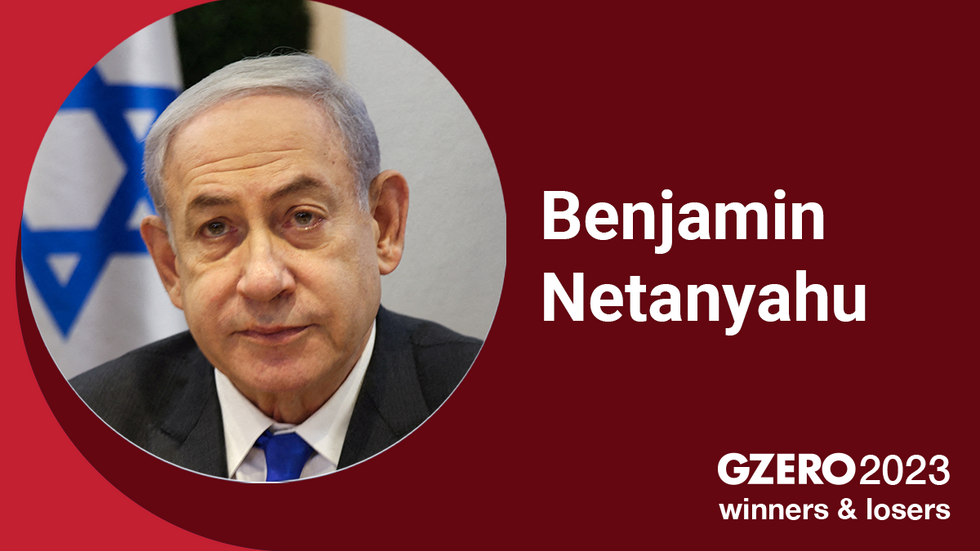
The wily rightwinger returned to power in Israel late 2022 despite his ongoing legal troubles, but it’s been downhill since. All summer, he faced massive protests over his plan to weaken Israel’s courts. Then, the biggest massacre of Jews since the Holocaust occurred on his watch, prompting fierce domestic criticism of the failures of intelligence and strategy that enabled Hamas to attack on Oct. 7. Israeli society broadly supports Bibi’s stated aims of defanging Hamas and bringing home the hostages (two goals that may in fact be in conflict), but a majority of Israelis still want him to resign.
Migrants on the move
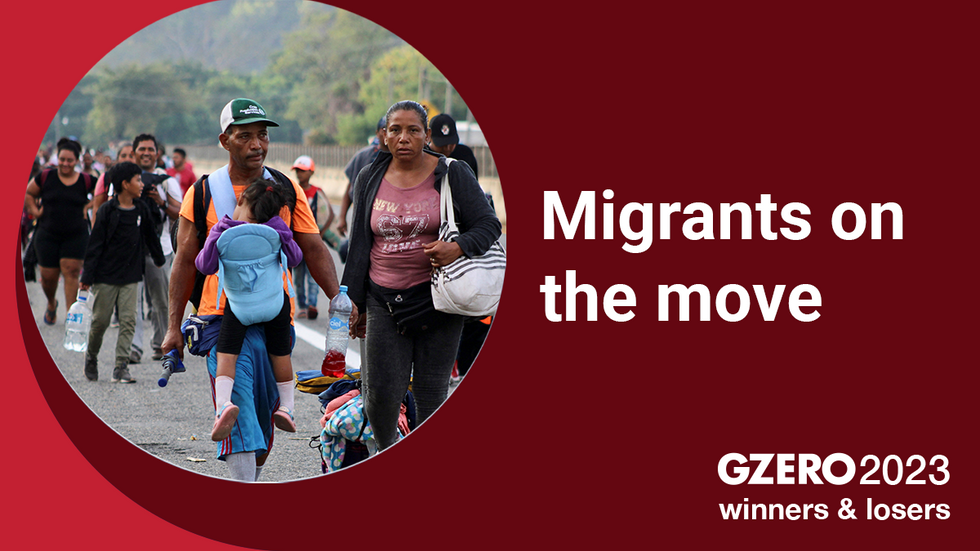
This year the political winds began to shift swiftly against migrants and asylum seekers seeking new lives in the world’s leading economies. In the EU, the number of migrants neared levels not seen since the Syrian refugee crisis in 2016, boosting anti-immigrant politicians and forcing the EU to tighten asylum rules in a long-debated migration policy reform. Meanwhile, in the US, record numbers of undocumented migrants crossed the southern border, empowering Republicans in Congress to hold up funding for Ukraine for tighter border policies. Expect tough talk on migration to play well in the EU Parliament elections next June and the US presidential election in November.
Imran Khan
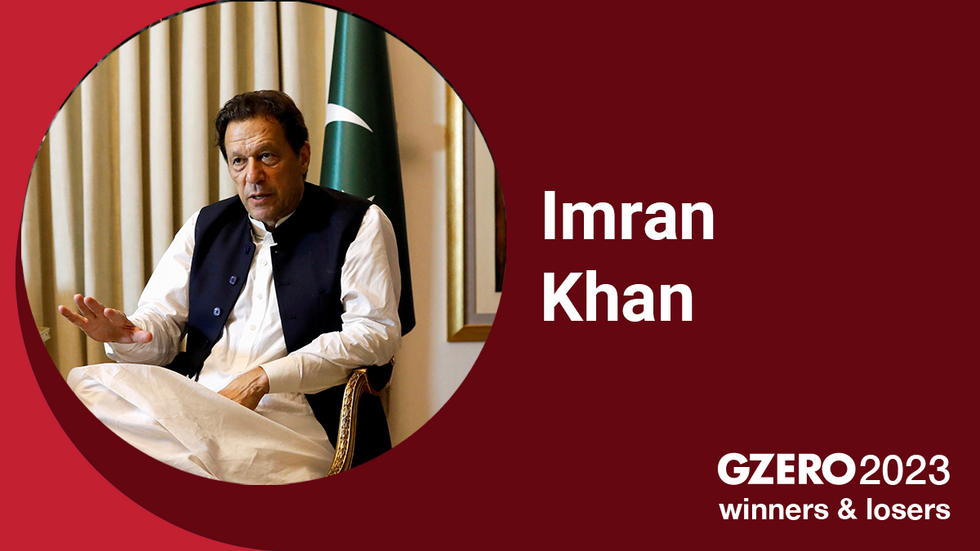
The hugely popular former Pakistani Prime Minister – who was ousted in a no-confidence vote in 2022 – went from looking like he might sweep back to power in elections this year to being locked up in prison, forced to use an AI replica to get his message out. He was imprisoned in August on corruption charges that he and his followers say are bogus, and the elections that were supposed to return him to power were postponed until next year. His legal troubles may keep him off the ballot entirely. Still, he remains an immensely potent force in Pakistani politics, making a 2024 comeback impossible to rule out.
People who opposed coups in Africa
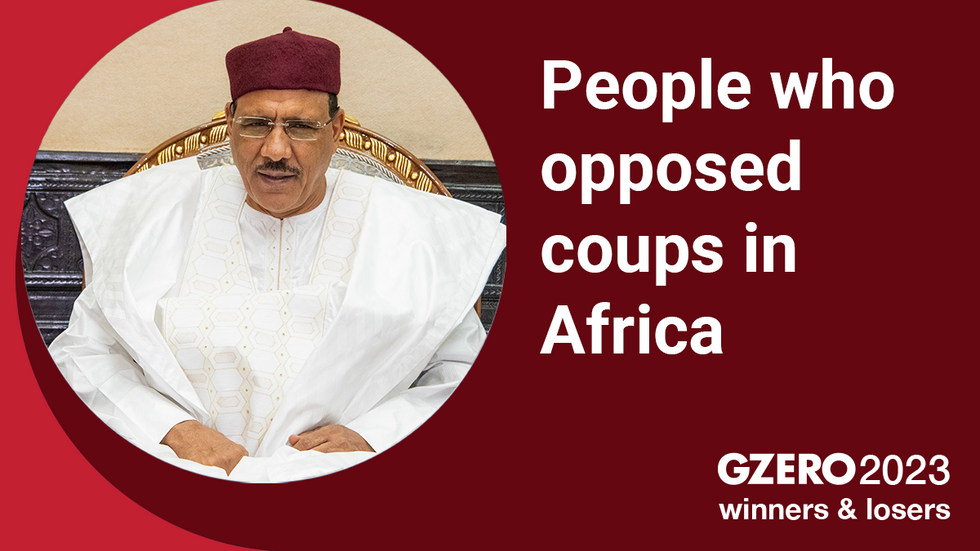
On the heels of coups last year in Mali and Burkina Faso, this year saw governments deposed in both Niger and Gabon. Niger’s democratically-elected government was overthrown by soldiers from the presidential guard in July. Similarly, Gabon military officers seized power in August, unseating the longtime president shortly after he was declared the winner of a contested election. The recent coups come amid a larger trend of increasingly frequent coups in the region – nine over the past three years – which have harmed economic well-being and raised concerns about regional security.
The very biggest losers: Anyone who didn’t subscribe to the GZERO Daily Newsletter

A no-brainer right here. Anyone who wasn’t getting the Daily in 2023 lost out on the best daily dose of global politics that’s out there – delivered right to your inbox with insight, kindness, and humor. The good news is you can still subscribe – sign up here, and you’ll already be a 2024 winner before the year has even begun!
Afghanistan's captain Hashmatullah Shahidi celebrates the team's victory against Pakistan in the ICC Men's Cricket World Cup 2023, at MA Chidambaram Stadium, in Chennai on Monday.
Afghanistan’s cricketers inspire nation with World Cup dream
The streets of Kabul erupted in joy Monday night as Afghans celebrated their national team’s massive upset victory against Pakistan in the Cricket World Cup. It’s a brief moment of elation amid the crushing crises that have immiserated millions since the US withdrawal.
The stunning eight-wicket win against one of the sport’s most celebrated sides put Afghanistan in a four-way tie for a knockout stage berth. They face an uphill climb for a shot at the trophy, though: The mighty South African and Australian teams are sure to put Afghan bowlers and batters through their paces, and they’ll have to beat both Sri Lanka and the Netherlands as well. If they manage to pull it off, waiting in the knockout stages is thus-far undefeated India, playing at home to roaring crowds.
Intimidating, but cricket is a game that rewards resilience, a trait Afghans have shown they possess in spades over the trials of the last half-century. Many members of the Afghanistan Cricket Board fled the country after the Taliban takeover, and the team has since played home games in the United Arab Emirates and India.
Daily life for those back home teeters on the knife’s edge: The World Food Program is urgently calling for $400 million to keep the country fed through winter as the families that can afford food report spending 91% of their incomes to buy it. Women are shut out of public life so totally that 90% of the victims of recent earthquakes near Herat were women and children, stuck indoors during the day.
That’s just a taste of the pressure the Afghan players will feel to bring a little joy and hope into the darkness when they take on Sri Lanka next week. If this sounds like must-see TV to you, read this cricket explainer for Americans, brew up some coffee, and we’ll see you at 4:30 a.m. on Monday.



